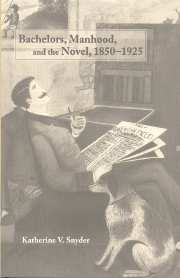Book contents
- Frontmatter
- Contents
- Acknowledgments
- Abbreviations
- Introduction
- Chapter 1 Trouble in paradise: bachelors and bourgeois domesticity
- Chapter 2 Susceptibility and the single man: the constitution of the bachelor invalid
- Chapter 3 An artist and a bachelor: Henry James, mastery, and the life of art
- Chapter 4 A way of looking on: bachelor narration in Joseph Conrad's Under Western Eyes
- Chapter 5 The necessary melancholy of bachelors: melancholy, manhood, and modernist narrative
- Afterword
- Notes
- Bibliography
- Index
Chapter 5 - The necessary melancholy of bachelors: melancholy, manhood, and modernist narrative
Published online by Cambridge University Press: 22 September 2009
- Frontmatter
- Contents
- Acknowledgments
- Abbreviations
- Introduction
- Chapter 1 Trouble in paradise: bachelors and bourgeois domesticity
- Chapter 2 Susceptibility and the single man: the constitution of the bachelor invalid
- Chapter 3 An artist and a bachelor: Henry James, mastery, and the life of art
- Chapter 4 A way of looking on: bachelor narration in Joseph Conrad's Under Western Eyes
- Chapter 5 The necessary melancholy of bachelors: melancholy, manhood, and modernist narrative
- Afterword
- Notes
- Bibliography
- Index
Summary
This chapter is not about bachelor uncles, although it could have been. The bachelor uncle is a stock character in popular and literary writing of the nineteenth and twentieth centuries, a figure so prevalent that the 1850s Harper's story “Why My Uncle Was a Bachelor” might almost as plausibly have been entitled “Why My Bachelor Was an Uncle.” In fictional plots of inheritance and education, adoption and guardianship, illegitimate fatherhood and incest, the figure of the bachelor uncle registers the boundaries of normative bourgeois familial and sexual relations, as well as the permeability of those boundaries. The function of the bachelor uncle as a threshold figure who marks by crossing the boundaries of familial and sexual normativity is evident, for example, in a 1908 Putnam's Magazine piece, entitled “The Necessary Melancholy of Bachelors.” While the essay is amply substantiated with melancholy bachelors from history and literature — Shakespeare's Antonio, Lord Macaulay, Robert Burton, Thomas Gray, Oliver Goldsmith, and Charles Lamb are all brought forward as evidence — the narrative mise en scène also testifies to the essay's premise. It is no coincidence that the melancholy bachelor who narrates this essay is also a bachelor uncle.
The essay's narration is framed by a reported exchange between the bachelor uncle and his niece, who initiates the conversation by observing that money is necessary to bachelor comfort and therefore to bachelor happiness.
- Type
- Chapter
- Information
- Bachelors, Manhood, and the Novel, 1850–1925 , pp. 172 - 210Publisher: Cambridge University PressPrint publication year: 1999



